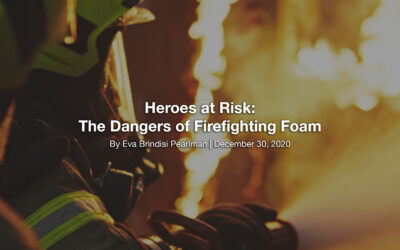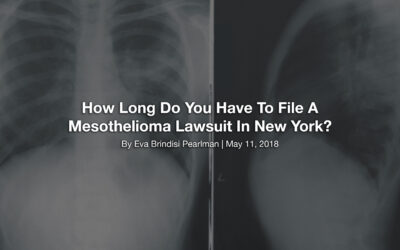We are fully aware of the carcinogens in tobacco products, but did you know that we are often exposed to carcinogens in our every day lives?
From food, to clothing, to cosmetics, to gardening, these chemicals are unknowingly everywhere. However, the need for concern differs with each product.
Chemicals known as PFASs or PFCs are raising concerns about potential health risks. The chemicals can be found in a wide variety of consumer goods that could affect potentially everyone. One of the major manufacturers that uses this chemical claims they are safe, however, recent animal studies by advocacy organization Environmental Working Group (EWG) have shown links to birth defects and low birth weight.
According to the EWG, products containing PFAs include:
- Carryout containers like sandwich wrappers or pizza boxes
- Non-stick pots, pans, and utensils
- Popcorn bags
- Outdoor clothing
- Camping tents
- Stain-repellant or water-repellant clothing
- Stain treatments for clothing and furniture
- Carpeting and carpet treatments
- Various cosmetics
Health officials claim that more research needs to be done before making assumptions about the chemicals. But should we boycott these items?
The EWG says consumers should be cautious when using the above listed items, but there is no reason to wait for new regulations since they may take from 10 to 15 years to come into effect.
As you can see, chemicals could be anywhere, but let’s take a deeper look into the more common products that contain potentially harmful chemicals.
Food
A new study has found that eating fast food may expose an individual to dangerous chemicals known as phthalates. These chemicals have been linked to causing birth defects, childhood chronic diseases like asthma, and various childhood behavioral problems. The study discovered that people who consumed a lot of fast food tended to have levels of the possibly damaging chemical in their urine that were 24 to 40 percent higher than those who rarely consume fast food. Though the study did not prove a cause and effect relationship, it may cause some apprehension among consumers. The phthalates in question are used to make plastic flexible, which is often utilized by food packaging and food-processing machinery. This means the chemicals are most likely to get into the fast food via the processing. However, it may also come from the packaging in which it is stored both prior to cooking and when it is served to the consumer. Phthalates may even be transferred from the vinyl gloves the food service employees wear to prevent food poisoning. Because fast food restaurants do not use any fresh ingredients, they are the “ultimate processed food platform,” says Shanna Swan, a professor of obstetrics, gynecology, and reproductive science with the department of preventative medicine at Mount Sinai’s Icahn School of Medicine in New York City. “My recommendation always is to minimize exposure to processed foods.” The studies have concluded that the more fast food consumed, the higher the exposure to the harmful chemicals. It is especially recommended that pregnant women consume as little, if any, fast food as possible, to ensure the good health of her infant.
Recently made official in October of 2015, processed meats are now a known carcinogen. Evidence has shown that individuals who eat large amounts of processed meats and red meats get bowel cancer more frequently than those who do not. Experts say that eating 50 grams of processed meat every day will raise your risk of developing colorectal cancer by 18%. Links to pancreatic and prostate cancer have been made as well. So, how much is 50 grams? Not much, it is only about two slices of thick-cut bacon or two-and-a-half slices of packaged bologna.
BPA is a chemical that can damage your hormone system. The chemical is also a fundamental element to most plastics and resins. Specifically, it lines the inside of cans and many drinking bottles. After extensive research, BPA has been linked to increased rates of cancer, especially breast and prostate tumors. BPA alters gene expression in ways that stimulate the growth of breast cancer cells. In other countries like France and Denmark, they have legislation that eliminates the use of BPS, but many have not followed in their footsteps. The U.S. Food and Drug Administration, or FDA claims that BPA is safe at lower levels. Nonetheless, many larger manufacturers like Toys ‘R’ Us and Walmart have stopped selling baby bottles containing BPA, and famous water bottle company Nalgene, has promised the same. Today, it may be a good idea to look for water bottles that say “BPA Free.”
However, there are also various products that contain carcinogens that pose little threat. Many healthier foods also contain formaldehyde, a chemical that causes cancer. Yet, experts say that it is not just what you are exposed to, but how much. Various baby shampoos are under fire for containing formaldehyde. Nonetheless, it is believed you would have to wash your child’s hair over 40 million times in a day in order to reach the level of formaldehyde that threatens human health.
If that does not convince you, here are 20 fruits and vegetables the FDA claims that contain formaldehyde:
- Apples
- Apricots
- Bananas
- Beetroot
- Bulb vegetables like onions
- Cabbage
- Carrots
- Cauliflower
- Cucumbers
- Grapes
- Green onions
- Kohlrabi
- Pears
- Plums
- Potatoes
- Spinach
- Tomatoes
- Watermelon
- White radish
- Shiitake mushrooms
It is nearly impossible to avoid all of those foods, and there is probably no reason to, as it does not matter if you are exposed, but by how much.
Dietary Supplements
In the fall of 2015, the FDA announced the results of a yearlong sweep of dietary supplements to recognize potentially hazardous or tainted supplements. The sweep concluded with civil injunctions and criminal actions against 117 different manufacturers or distributors of dietary supplements that were circulating tainted products disguised as dietary enhancements. Among the arraigned, USPlabs, a company from Dallas, Texas lied about the source of the ingredients found in their products, claiming they were natural plant extracts when they were using a synthetic stimulant manufactured in a chemical factory in China. The negligence lawsuit also alleges that the company sold their dietary supplements without determining if they would be safe to use. Furthermore, the company was well-aware of the studies that linked their products to liver poisonousness.
To add to their astounding track record, USPlabs told the FDA that it would stop the circulation of OxyElite Pro once it had been associated in an outbreak of liver damages in October of 2013. Following this agreement, it is reported that USPlabs engaged in a covert, all-hands-on-deck approach to sell as much OxyElite Pro as they could and as quickly as possible. The product was sold at various dietary supplement stores across the country. After more than 97 people were injured, several facing liver transplants, and one death of a woman, the company was forced to recall their product from the shelves. However, they continue to sell other dietary supplement products.
Cosmetics
The nail salon industry is thriving. There are over 17,000 nail salons in the United States, employing approximately 87,000 workers in 2012, with the number estimated to grow by 16% by 2022. Still, it comes with a price. Many nail salon workers face products containing carcinogenic chemicals every day. Though the FDA has banned the use of cosmetic products containing harmful or poisonous elements, many frequently used cosmetic products contain the “toxic trio” or toluene, formaldehyde, and dibutyl phthalate. These chemicals have been associated with reproductive harm, respiratory problems, and cancer. The chemical toluene is a solvent that helps nail polish apply smoothly, but it can also affect the central nervous system and can cause irritation to the eyes, throat, and lungs. Formaldehyde, a chemical listed above is a nail hardening agent and a well-known carcinogen. Dibutyl phthalate is a chemical that keeps nail polish flexible and has been known to interfere with reproductive hormones. It has proved to be impossible to police nail salons, as many products claiming to be “three-free” do, in fact, contain the chemicals. Legislative reform has been suggested, but would take too long to protect nail salon workers and their clientele.
Clothing
Not even clothing is immune to the list of products that cause cancer. Own any wrinkle-free clothing or bedding? These products use a formaldehyde-based resin to treat the materials. Also, as previously stated, clothing that is water-repellent contains PFAs, a chemical linked to birth defects and reproductive issues. In addition, if your t-shirt is decorated with ink that feels like rubber, it most likely contains phthalates.
Gardening
Glyphosate, a main ingredient for various brands of herbicide may be exposing unknowing consumers to cancer. Since being announced in September of last year as a carcinogen, the chemical is newly being investigated. Since that time, states like California are requiring manufacturers to publish a list of chemicals known to cause cancer, birth defects, or other reproductive damages, in an effort to clearly warn the consumer of potentially harmful chemicals. Glyphosate specifically has been linked to cause congestion of the lungs, increased breathing rate, kidney damage, and unsafe reproductive effects. This chemical is used on many food and non-food crops as it often helps with plant regulation on farmland. It is most commonly used to control weeds and grasses. Not only that, but it is amid the most widely used, with millions of pounds used each year in the U.S. alone.
Exposure to Children
Unfortunately, children are not immune to the exposure of carcinogens. A chemical mentioned above, BPA, is often found in infant bottles. Furthermore, after the Children’s Safe Product Act came into affect in Washington, Graco, a popular manufacturer of strollers, car seats, and other children’s products, stopped reporting the use of tetrabromobisphenol A in some of their car seats; meaning they most likely halted the use of this chemical. Tetrabromobisphenol A is a flame retardant that some studies have associated with uterine cancer in rats. When requested for confirmation, Graco denied to comment. After the law was passed, data showed steep declines in the use of chemicals by major manufacturers like children’s clothing brand Carter’s or toy company Greenbrier International.
Many are seeking transparency when it comes to products containing carcinogenic chemicals. And we couldn’t agree more. It forces companies to consider what they are putting into their products, and not just the profit they are receiving for producing these dangerous goods.
Many of these cases could easily lead to personal injury claims due to product liability. Many consumers are completely oblivious to several of these dangerous chemicals in everyday items. Sadly, many of these larger corporations risk personal injury liability to make a profit. This may be considered negligent behavior and may lead to a negligence lawsuit, if injury or harm results.
To file a product liability personal injury claim, you need an experienced lawyer in Utica, NY. The lawyers at Brindisi, Murad, Brindisi & Pearlman have product liability negligence experience and will work hard to find a solution that works best for you. Live in the Syracuse area…no problem, we also have an office in Syracuse, NY. Don’t look for just any personal injury lawyer, contact The People’s Lawyers for a free consultation today. We’re New York attorneys willing to fight to get you the compensation you deserve.
Share this blog with your friends…

CONTACT US FOR A FREE CASE EVALUATION
Related Blogs
Heroes at Risk: The Dangers of Firefighting Foam
Firefighting foam chemicals, nicknamed “forever chemicals,” have been linked to the development of cancer. The men and women who selflessly run towards danger every day are at the highest risk of AFFF cancer due to high exposure rates. It is believed that the...
I Am Not A Farmer…But Am I Still At Risk For Cancer From RoundUp?
Millions of homeowners spend hours on their yards to keep them neat and trim. An enemy of this process is something homeowners know all too well: weeds. In order to combat them, many turn to herbicides like Roundup. However, the ingredients in Roundup weed...
How Long Do You Have To File A Mesothelioma Lawsuit In New York?
For millions of Americans who have worked hard their entire life, retirement means finally relaxing and enjoying family. Unfortunately for some, their lifetime of work may come at a cost. After being exposed to asbestos many years ago, many victims are being...
Injured In An Accident?
Contact BMBP Today!






BRINDISI, MURAD & BRINDISI PEARLMAN
UTICA OFFICE
Utica, NY 13501
OFFICE HOURS
MONDAY – FRIDAY
9AM-5PM


